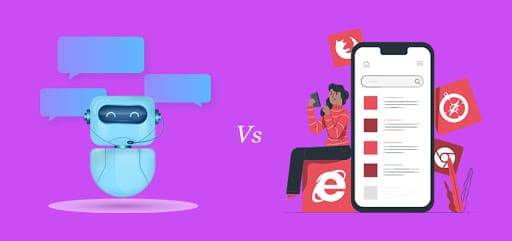Chatbots Vs. Mobile Applications – Who Comes Out on Top of This Race?

TechsPlace | All over the world, mobile apps have become the go-to tactic for organizations. Today, no organization in the world has not invested in this sector. Mobile apps and mobile app development these days are no longer a fashion symbol; they have become a necessity. Those businesses without mobile apps fall behind the competition. Mobile applications have revolutionized every segment of the industry; thus it’s essential for all to be aware of the latest trends. In the past few years, another innovation has taken place; this innovation is known as the Chatbots. It has taken the world by storm and has become a true buzzword in the last few years.
Cortana, Siri, Facebook Bot, Bixby, and so on. Chatbots, turbo-charged with AI, or Artificial Intelligence are now commonplace in every aspect of our daily lives. Bots have become a great part of custom software development and in mobile applications that everyone knows about it. With these bots entering and establishing their presence, mobile applications gradually are taking a backseat. Or rather, they evolve to become as intelligent and as smart as bots.
In no time at all, cots would be our main source of connection with anything on the web. It would revolutionize mobile apps a great deal.
How Chatbots are Outpacing Mobile Applications
- Ultra-personalized customer service
Machine Learning and AI enable a bot to learn and understand customer preferences continuously, making them more responsive, the same as a real-life assistant would be. Every time a customer interacts with a bot, such as asking a question or recommending a product, the bot will learn and store it in its memory for use in the future.
These bots work like our human brains, but with more accuracy. Mobile apps or courses are not able to do this. The most that apps could do is to let users set preferences or configure settings to the products or services that are accordingly offered.
When it comes to personalization, apps by nature are more rigid. Chatbots go a step ahead, offering ultra-personalization, serving the exact preferences of a user with no need to ask for input each time.
- Wider audience reach
With the continuous evolution of mobile app development, over the years, messenger applications have surpassed social media applications, as well as every other app category in the app stores. Messenger apps, such as Viber, WhatsApp, Facebook Messenger, and WeChat, have outdone social networks in use.
Facebook took a step further by launching the Facebook Bot, an AI platform that organizations could utilize to integrate a bot into messenger. Messenger responds to the queries of customers, which reach the inbox of the page, providing live chat support for consumers.
Bots are favored than mobile applications, with bigger reach and flexibility in integrating with any third-party service. The apps that mobile developers build are restricted by platforms, such as iOS, Android, or Windows. Bots, however, could function anywhere, whether it’s a mobile app, website, or third-party software, making them a sure winner.
- Augmented user engagement
Mobile applications succumb to three major challenges, not like bots. Apps need bigger storage space, and often they’re slow and could be optimized to the only market to a certain extent, such as in-app messaging or push notifications. In all these areas, the bots score above mobile applications.
In real-time, bots could chat and interact with consumers. The user interfaces are conversational, in which customers ask questions and get inputs from a bot. The perfect example is the chatbot on Kik by Sephora, providing customers with relevant suggestions in cosmetic products.
Bots bring the point of sale to the screen of the customer. On the other hand, mobile apps work the other way around – directing a customer to products instead. In selling, this technique is not always effective. Augmenting the user experience could lead to a very different and new conversational eCommerce wherein before any transaction takes place, customers interact with bots first.
- Cost savings
From the perspective of an organization, the development, deployment, and maintenance of a mobile application are not cost-effective. The average cost of app development could range anywhere, from $10,000, and so on. Depending on the choice of platform, costs again are subject to change.
Also, there are additional incurred costs for continuous upgrades and maintenance. Self-learners, bots could learn and upgrade on their own through creating the information gathered from user input. This leads to a considerable reduction in costs for business organizations. Also, there are so many bot building tools available online, and even amateur coders could create and launch their bots.
Bringing all Together
For organizations nowadays, a chatbot over a mobile app is the way forward. There are numerous benefits that bots could offer, which definitely would delight consumers and result in considerable savings. Where human-like interactions, bots could bring a human touch.
On an average day, sooner or later, we’ll be talking to more chatbots than humans. So, would mobile applications perish? Not really.
We can however be sure that both mobile apps and bots would co-exist. It’s just that bots would be more dominant in terms of presence and usage compared to mobile applications.
At present, bots only gain momentum on the innovative software market. However, they have managed to prove their effectiveness already in different tasks, such as event scheduling, customer support, management of an enterprise app, and shopping. Chatbots, regardless of all their advantages, would hardly replace mobile apps entirely because the latter is now an essential part of the ecosystem of mobile software over the past decade.
Conclusion
Chatbots are adding quality to your mobile application, particularly with support for intelligence gained via AI. Business organizations think differently and think smart by adding bots to boost mobile app downloads and increase the engagement of users.
Bots give an edge to any organization and help boost the rates of conversion. Chatbots may not altogether replace and remove mobile applications, but they could greatly enhance the process. The two could work in tandem to meet both business and user requirements.
I’m Morgan is currently working as an IT Consultant. From an IT background, he likes to share informative and insightful articles, blogs about the development of mobile apps. His passion is to help the organization in all its shapes





